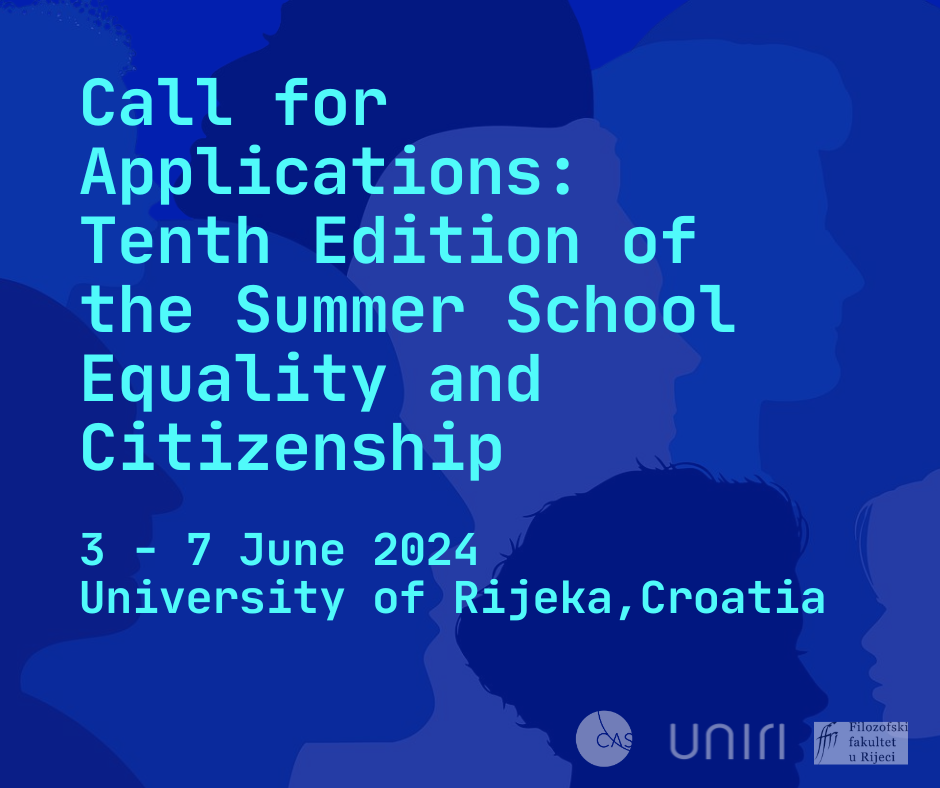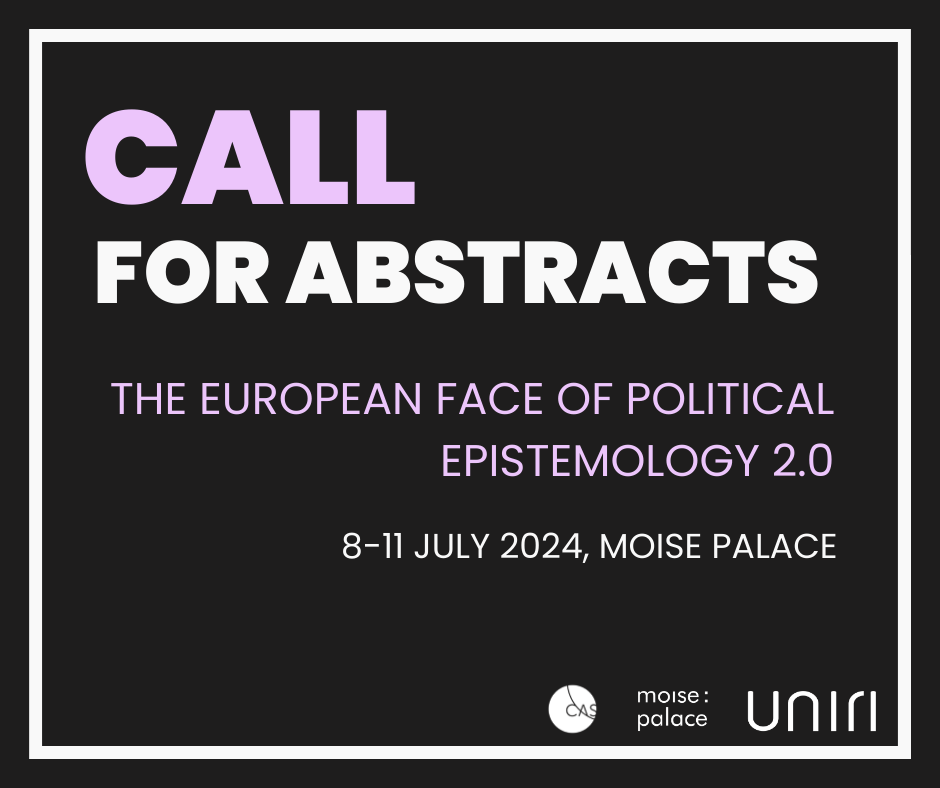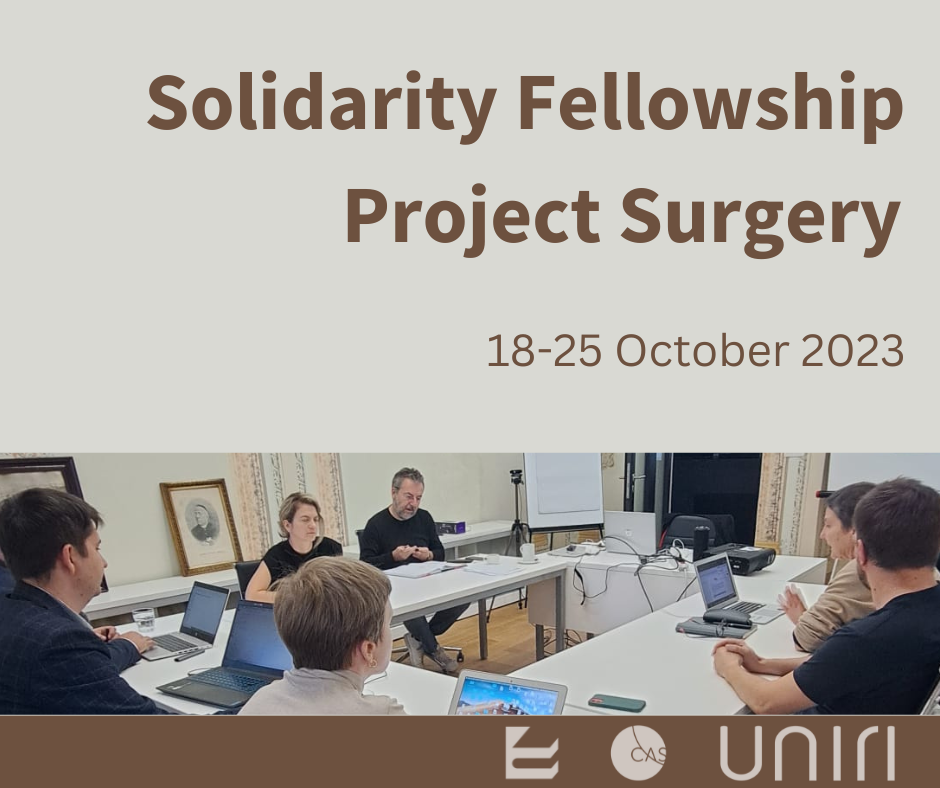RETHINKING POLITICS OF DIVERSITY
RIJEKA UNIVERSITY CAMPUS, FACULTY FOR THE HUMANITIES AND SOCIAL SCIENCES, Sveučilišna avenija 2, IV Floor; Room 401, Rijeka
September 12th – September 16th 2016
Organized by:
Center for Advanced Studies – South East Europe, University of Rijeka
In cooperation with:
Institute for Philosophy and Social Theory, University of Belgrade
Friedrich Ebert Stiftung – Zagreb
University Paris 8, Vincennes-St Denis
Center for Women’s Studies, University of Rijeka
This summer school should provide space for recasting frameworks of “diversity politics” and “diversity discourses” in Europe. In light of recent events, we would like to challenge the crisis of multiculturalism and core European values of solidarity and human rights. The “failure of multiculturalism” narrative has become all too present in Europe, shifting the rhetoric to cultural anxieties and articulating immigration as a national threat. This discourse has also affected “internal immigration”, making certain groups throughout Europe less visible and more vulnerable: Roma, refugees and internally displaced persons, certain LGBTQ communities. Moreover, ethnicity, nationality, religion and race are being forcefully reshuffled, inviting contemporary forces of nationalism and securitization. Hereby, we are particularly interested to the effects of the ways how European countries ‘manage’ diversity through its policies and practices: from ethnic and racial to socio-economic diversity, but also particularly to citizenship and migration status diversity. It is of crucial interest to map and evidence differences among significantly varying Western European practices (France, UK, Germany etc.), Central European practices (former communist countries with strong opposition to multiculturalism) and South-Eastern European practices in countries where migration is observed as passing-by phenomenon.
The lectures and seminars of this summer school particularly investigate how these three identified regions policies connected to governmentality of diversity are changing after the recent and actual conflicts and migration flows. The summer school will particularly focus on policies and practices that affect marginalized and vulnerable groups in these regions.
The summer school’s main goal is to highlight the agency of these marginalized groups in order to understand, how they themselves respond to the reconfigurations of diversity politics and practices.
TIMETABLE
Monday, Sept 12, 2016
|
Time |
Activity | Lecturers |
Abstract and/or suggested readings |
| 10.30
11.30 |
Arrival and Registration | ||
| 11.30
12.00 |
Opening session:
Introduction |
Julija Sardelic, Gazela Pudar Drasko, Sanja Bojanic, Brigita Milos, Adriana Zaharijevic | |
| 12.00
12.30 |
Coffee break | ||
| 12.30
14.00 |
Lecture and Debate:
Refugee Crises, the Question of Multiculturalism and Position of Marginalized Minorities |
Julija Sardelic
School of Law and Social Justice, University of Liverpool |
– Biljana Đorđević (2015) Whose Rights, Whose Return? The Boundary Problem and Unequal Restoration of Citizenship in the Post-Yugoslav Space, Ethnopolitics, 14:2, 121-139, DOI: 10.1080/17449057.2014.991150 – Giuseppe Forino (2016) From Gevgelija to Budapest: The bare life in transit camps of the Balkans and Eastern Europe, Transnational Social Review, 6:1-2, 180-186, DOI: 10.1080/21931674.2016.1186420 – Viktor Koska (2015) Refugee Integration and Citizenship Policies: The Case Study of Croatian Serbs in Vojvodina, Ethnopolitics, 14:2, 180-196, DOI: 10.1080/17449057.2014.991155 – Gëzim Krasniqi (2015) Equal Citizens, Uneven Communities: Differentiated and Hierarchical Citizenship in Kosovo, Ethnopolitics, 14:2, 197-217, DOI: 10.1080/17449057.2014.991152 – Julija Sardelić (2015) Romani Minorities and Uneven Citizenship Access in the Post-Yugoslav Space, Ethnopolitics, 14:2, 159-179, DOI: 10.1080/17449057.2014.991154 |
| 14.00
15.30 |
Lunch Break | ||
| 15.30
16.30 |
Presentation of the project and Debate:
Global Migration Governance: Will 2016 be the decisive year?
|
Caroline Schultz
Expert Council of German Foundations on Integration and Migration, Berlin |
Migration management remains one of the last bastions of national sovereignty. As a result, most countries traditionally tend to be more cautious when setting international standards related to migration. Global migration governance therefore resembles a fragmented tapestry. Since the turn of the millennium, however, there has been considerable movement in the international fabric of norms and rules on migration: migration plays a role in many areas of the UN system, outside of the UN as well, migration issues are increasingly discussed on the international stage. Germany is also more and more involved in global migration policy, and not just since the sharp rise in refugee arrivals over the last two years. For example, in 2017/2018 Germany, together with Morocco, will chair the Global Forum on Migration and Development (GFMD). The presentation will provide a critical overview of global migration governance, taking into account the most recent developments leading up to the September 19th UN high-level meeting to address large movements of refugees and migrants and sketch out what lays ahead in this field. |
| 16.30
17.00 |
Concluding remarks for the day | ||
| 17.00
17.30 |
Photo exhibition opening (Faculty for the Humanities and Social Sciences, Main Hall):
Out of Sight: Poverty, Rurality, Gender |
Jelena Ćeriman, CELAP
Miloš Kosovac, CELAP Kristina Smoljanović, CAS SEE |
The exhibition “Out of Sight: Poverty, Rurality, Gender” deals with gender and social disparities in rural areas and focuses on specific areas of social politics. The intersection of exclusion, poverty and gender means that the slightest social tremor plunges those living in poverty and isolation into isolation and neglect. We innovated the way in which we communicate research results by including representatives of the group itself into the creative part of work and allowing them to demonstrate their capacity of perceiving inequalities, barriers and obstacles they meet in everyday life. They achieve this through making photos. Using a camera, girls, young women and women from rural areas complemented our results and ethnographic materials made by our researchers, by giving a human face to poverty and social exclusion. |
Tuesday, Sept 13, 2016
| Time | Activity | Lecturers |
Text |
| 10.00
11.30 |
Lecture and Debate:
|
Gezim Krasniqi
School of Slavonic and East European Studies, University College London |
– Andreas Wimmer, Nationalist Exclusion Ethnic Conflict: Shadows of Modernity (Cambridge University Press), 2002. – Rogers Brubaker, Grounds for Difference. Harvard University Press, 2015. Chapter 1. – Nancy Fraser, From Redistribution To Recognition? Dilemmas Of Justice In A ‘Post-Socialist’ Age, New Left Review, I/212, July-August 1995 – https://newleftreview.org/II/3/nancy-fraser-rethinking-recognition – Nina Bandelj and Mathew C Bahutga, How Socio-Economic Change Shapes Income Inequality in Post-Socialist Europe, Social Factors (2010), 88:5 |
| 11.30
12.00 |
Coffee break | ||
| 12.00
13.30 |
Lecture and Debate:
Multilingualism in European Literature and Cultural Diversity |
Jörg Schulte
Institute of Slavonic Studies, University of Cologne |
– Mehrsprachigkeit in Zentraleuropa: Zur Geschichte einer literarischen und kulturellen Chance. Hrsg. v. András F. Balogh. Wien 2012. – Nabokov, Vladimir/Boyd, Brian: Verses and Versions: Three Centuries of Russian Poetry. Orlando 2008. – Niger, Samuel: Bilingualism in the History of Jewish Literature. Lanham 1990. – Radaelli, Giulia: Literarische Mehrsprachigkeit: Sprachwechsel bei Elias Canetti und Ingeborg Bachmann. Berlin 2011. – Weissbort, Daniel: Translation: Theory and Practice. A Historical Reader. Oxford 2006. |
| 13.30
15.00 |
Lunch Break | ||
| 15.00
16.30 |
Presentation of the Project and Debate:
Accepting the Difference: Feminist Theory in the class and Feminist Press in Serbia in the 1990s and 2000s |
Biljana Dojcinovic and Ana Kolaric
Faculty of Philology, University of Belgrade |
– Biljana Dojčinović (2006). “De-centerd Pluralism of Methods: Feminist Literary Criticism in Serbia” u GendeRingS, Gendered Readings in Serbian Women’s Writing, Indok centar 2006. (pdf knjige u prilogu, prvi tekst u knjizi) – Dojčinović B., Koch, M. (2011) “In Search of Women Authors”, an Interview with Suzan van Dijk, http://www.knjizenstvo.rs/magazine.php?text=25. – Afterword: We Other Periodicalists, or, Why Periodical Studies?, Manushag N. Powell, Tulsa Studies in Women’s Literature, Volume 30, Number 2, Fall 2011, pp. 441-450 – Ana Kolarić “Rane kritike Rebeke Vest” http://www.knjizenstvo.rs/magazine.php?text=132 |
| 16.30
17.00 |
Concluding remarks for the day | ||
Wednesday, Sept 14, 2016
| Time | Activity | Lecturers |
Text |
| 10.00
11.30 |
Lecture and Debate:
Europe and its Others: The Figure of the Migrant in the Construction of the European Union |
Céline Cantat
Central European University, Budapest |
– Balibar, Etienne, 2003, We, the People of Europe? Reflections on Transnational Citizenship (Princeton University Press) – Delanty, Gerard, 1995, Inventing Europe: Idea, Identity, Reality (Macmillan). – Fekete, Liz, 2001, “The Emergence of Xeno-Racism,” Race & Class, Vol. 43, no. 2. |
| 11.30
12.00 |
Coffee break | ||
| 12.00
13.30 |
Lecture and Debate:
The Road Not Taken. Neoliberalism, Xenophobia, and Terrorism |
Eric Fassin
University Paris 8, Vincennes-St Denis |
– Eric Fassin, “National Identities and Transnational intimacies: sexual democracy and the politics of immigration in Europe”, Public Culture, 22:3, Duke University Press. http://www.jstor.org/stable/10.5406/historypresent.1.2.0265?origin=JSTOR-pdf&seq=1#page_scan_tab_contents – Roms, une politique de la race https://vimeo.com/131783052 – Eric Fassin, “Criticism to Critique”, History of the Present, Vol. 1, No. 2 (Fall 2011), pp. 265-274. |
| 13.30
15.00 |
Lunch | ||
| 17.30
19.00 |
Round Table, City Hall, Rijeka
Hosted by the Mayor of Rijeka, M Vojko Obersnel |
Crossing Roads: Civil Society and Academia
(Speaking in Croatian) The question of representing the reality of society is fundamental and is now threatened by the triumph of simplified visions of society, visions of the other who does not correspond to reality. We couldn’t make democracy if we stayed in terrible ignorance of each other. Participating in this very same reality also demands a willingness to recognize that the democracy is intermittent and thoughtless, that it needs knowledge. Academia and civil society meet on crossroads of action and thinking. Both realms of common reality should think and study their actions and act in their research and studies. Doris Kramaric / PaRiter, Rijeka Lorena Zec / SOS Rijeka – centre for nonviolence and human rights Vedran Obucina / Institute for European and Globalisation Studies Nebojša Zelic / Faculty for Philosophy and Social Sciences, University of Rijeka Bojana Culum / Faculty for Philosophy and Social Sciences, University of Rijeka (TBC) Moderator: Danko Zitinic / University of Rijeka |
|
| 19.00
20.30 |
Reception at the Cukarikafe Bar (Trg Jurja Klovica 4, 51000, Rijeka) | ||
Thursday, Sept 15, 2016
|
Time |
Activity | Lecturers |
Text |
| 10.00
11.00 |
Presentation of the project:
When the Rooftops Became red Again: Post War Community Dynamics in Bosnia and Herzegovina |
Marika Djolai
CAS SEE Fellow, University of Rijeka, Institute for Development Studies, Brighton |
– George Hillery (1982), Research odyssey: developing and testing a community theory. New Brunswick. Transaction Books. – Roger Brubaker (2014), Ethnicity without groups. Cambridge, Mass; London: Harvard University Press. |
| 11.00
11.30 |
Coffee break | ||
| 11.30
12.30 |
Presentation of the project:
Topic area: Freedom of Expression and Hate Speech in Today’s Diversified Europe: Was that Supposed to Be Funny? Stand-Up Satire and ‘Political Correctness’ |
Edward Djordjevic and Jelena Ceriman
Center for Ethics, Law and Applied Philosophy, Belgrade |
– Fairclough, Norman. ‘Political Correctness’: Politics of Culture and Language. Discourse and Society 14(1):17-28, 2003. – Raul, Perez. Learning to make racism funny in the ‘color-blind’ era: Stand-up comedy students, performance strategies, and the (re)production of racist jokes in public. Discourse and Society 24: 478-503, 2013. – Borns, Betsy. Comic Lives: Inside the World of Stand-Up Comedy. New York: Simon and Schuster, 1987. – Butler, Judith. Excitable Speech: A Politics of the Performative. New York: Routledge, 1997. |
| 12.30
13.30 |
Presentation of the campaign and debate:
NO hate speech movement: lessons to be learnt |
Gazela Pudar Drasko
Institute for Philosophy and Social Theory, Belgrade
Member of the National Committee for Implementing Campaign for Combating Hate Speech Online of Republic Serbia |
– BOOKMARKS: a manual for combating hate speech online through human rights education |
| 13.30
15.00 |
Lunch Break | ||
| 15.00
16.30 |
Lecture and Debate:
Rethinking Inequality: Affect, knowledge, and politics of difference
|
Marjo Kolehmainen
Visiting fellow, GEXcel International Collegium for Advanced Transdisciplinary Gender Studies, Linköping university, Sweden, Postdoc, School of Social Sciences and Humanities, University of Tampere, Finland |
– Ahmed, Sara (2004): Affective Economics. Social Text 79, 22(2), pp. 117-139 – Hemmings, Clare (2012): Affective solidarity: Feminist reflexivity and political transformation. Feminist Theory 13(2), pp. 147-161 |
| 16.30
17.00 |
Concluding remarks of the day:
All lives matter: whose life is livable?
Is it enough to speak up? About affective inequalities and other misunderstandings |
Adriana Zaharijevic
Sanja Bojanic, Brigita Milos IFDT, University of Belgrade, CAS SEE, Center for Women’s Studies University of Rijeka |
|
Friday, Sept 15, 2016
|
Time |
Activity | Lecturers |
Text |
| 10.00
11.30 |
Lecture and Debate:
The “icy waters” of Europe and agonistic politics |
Athena Athanasiou
Panteion University of Social and Political Sciences, Athens |
– Judith Butler, Notes Toward a Performative Theory of Assembly. Cambridge, MA: Harvard University Press, 2015. – Chantal Mouffe, Agonistics: Thinking the World Politically. London: Verso 2013. |
| 11.30
12.00 |
Coffee break | ||
| 12.00
13.30 |
Lecture and Debate:
Nomadism and belonging in feminist postcolonial art |
Elena Tzelepis, Birkbeck Institute for the Humanities, University of London |
– Braidotti, Rosi, 2011, Nomadic Subjects: Embodiment and Sexual Difference in Contemporary Feminist Theory, New York: Columba UP, Second Edition. – Butler Judith and Athena Athanasiou, 2013, Dispossession: The Performative in the Political, Cambridge: Polity Press. |
| 13.30
15.00 |
Lunch Break | ||
| 15.00
17.00 |
Panel Discussion:
What is Left in Diversity and what is Diverse in Left? |
Opening remarks: Max Brändle (FES Zagreb)
Felix Henkel (FES Regional Office, Sarajevo), Athena Athanasiou (Panteion University of Social and Political Sciences, Athens), Adriana Zaharijevic (IFDT), Vuk Prica, (Chair of the Youth Council, Primorje – Gorski Kotar County), Nebojsa Zelic (Faculty for Philosophy and Social Sciences, University of Rijeka), Vedran Dzihic (CAS SEE), Sanja Bojanic (CAS SEE) |
|
CAS SEE University of Rijeka will prepare official CAS SEE certificates with detailed overview of the summer school program and students’ requirements (sufficient for 3 ECTS). The recognition of the ECTS depends solely on the institutions students are coming from. Summer School Program committee will sign the certificates at the end of the course.
Programme Board of the summer school:
Sanja Bojanic, CAS SEE/CWS, University of Rijeka
Eric Fassin, University Paris 8
Brigita Miloš, Center for Women Studies (CWS), University of Rijeka
Adriana Zaharijevic, IFDT, University of Belgrade
Violetta Zentai, CEU, Budapest
Petar Bojanic, CAS SEE, University of Rijeka / IFDT, University of Belgrade
Organization Board:
Gazela Pudar Drasko, IFDT, University of Belgrade (gazela.pudar@instifdt.bg.ac.rs)
Andrea Mešanovic, University of Rijeka (andrea.mesanovic@gmail.com)
Kristina Smoljanovic, University of Rijeka (ksmoljanovic@gmail.com)




